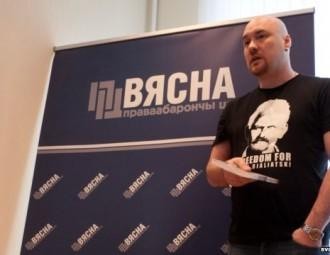Valiantsin Stefanovich: Human rights activists, like anyone else, would like to see Belarus in PACE

The pursuit of a full membership in PACE would mean that official Minsk shared the value-based approach to human rights and would indicate the beginning of an actual rapprochement with Europe.
On April 21 in Strasbourg a meeting of the PACE’s Committee on Political Affairs and Democracy took place in preparation of the report of the Special Rapporteur on Belarus Andrea Rigoni.
Valiantsin Stefanovich, deputy head of the Human Rights Center "Viasna" told about the current human rights situation in Belarus. At the beginning of his speech, he said that today the country witnesses the development of two parallel and are not yet interconnected processes: on the one hand, the intensification of foreign contacts of the Belarusan Foreign Ministry both with representatives of individual EU member states and with the EU as a whole, on the other hand, a complete lack of progress in the field of human rights within the country:
“Talking about the human rights situation in Belarus, we tend to use the phrase - a serious but stable. Indeed, human rights violations in our country have long become systemic and systematic. Speaking of systematic violations of human rights, I mean the extremely limited nature of the basic civil and political rights in national legislation,” press service of “Viasna” quotes him saying.
He named the main problems related to civil and political rights in Belarus.
Of particular concern to human rights defenders is the fact that the country’s prisons continue to hold political prisoners – Mikalai Statkevich, Ihar Alinevich, Mikalai Dziadok, Artsiom Prakapenka, Yauhen Vaskovich and Yury Rubtsou. “The recent actions of the authorities show a clear reluctance to address this problem. In particular, five days before the end of his sentence Dziadok was sentenced to one more year in prison; Rubtsou faced new criminal charges; Prakapenka was denied pardon, despite his request,” stressed Valiantsin Stefanovich.
Making his concluding statement, the human rights defendant said that “Belarusan human rights activists, like anyone else, would like to see Belarus a member of the Council of Europe”.
“The pursuit of a full membership in the Council of Europe would mean that the Belarusan authorities shared the value-based approach to the issue of human rights and would indicate the beginning of an actual rapprochement with Europe. However, at the moment we do not see the political will of the country’s leadership aimed at the implementation of the necessary conditions for Belarus’ membership in the Council of Europe – the abolition or a moratorium on the death penalty, the ratification of the European Convention on Human Rights and recognizing the competence of the European Court of Human Rights,” concluded Viasna deputy chair.
The meeting of the Committee on Political Affairs and Democracy was also attended by a representative of the movement "For Freedom" Ales Lahvinets and Chairman of the Foreign Affairs Committee of the House of Representatives of the National Assembly Mikalai Samaseika.
-
03.01
-
07.10
-
22.09
-
17.08
-
12.08
-
30.09








































